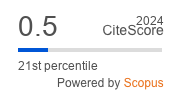Personality disorders and cardiovascular diseases (on model of cardiopersonified syndromes)
Abstract
The present study is based on a working assumption that personality disorders (somatoperceptive accentuation) and cardiovascular diseases (coronary heart disease, arterial hypertension) are initially independent dimensions and interact throughout the cardiac pathology (as opposed to the opinion that personality disorder is a predisposition factor for cardiovascular diseases). Objective: to study the interaction of different types of personality disorders (somatoperceptive accentuation) with cardiovascular diseases (on the model of arterial hypertension and coronary heart disease), taking into account the course of heart disease and therapy adherence. Methods: patients with arterial hypertension and coronary heart disease from the department of cardiology underwent cardiological examination using standart techniques, clinical interview with psychiatrist. Criteria for assessing prognosis of cardiovascular disease were developed. Results: 3 specific psychosomatic\cardiopersonified syndromes, formed by interaction of personality disorders and somatic illness, were obtained: the first — with a favorable course of cardiovascular disease, congruent somatoperceptive accentuation (somatotony/neuropathy) of personality disorder; second — with adverse course of cardiovascular disease, provoked by somatopercepive personality disorder (body image aloof); third — with unfavorable course of cardiovascular disease, comorbid neuropathic accentuation of personality disorder. Conclusion: favorable course of cardiovascular disease in condition of congruent somatoperceptive accentuation: personality disorder helps to improve the prognosis of the disease (prevention of complications, high therapy adherence). Unfavorable course in condition of body image aloof\neuropathy: personality disorder is associated with worsening of the prognosis (complications, low therapy adherence).
About the Authors
E. S. TernovayaRussian Federation
post-graduate student of the chair of psychiatry and psychosomatics of the Institute of professional education
B. А. Volel
Russian Federation
MD, prof. of the chair of psychiatry and psychosomatics of the Institute of professional education
E. A. Syrkina
Russian Federation
Elena Abramovna Syrkina, PhD, assistant prof. of the chair of preventive and emergency cardiology of the Institute of professional education
6–1 B. Pirogovskaya str., Moscow, 119992
8 (499) 248–78–66
I. B. Ardzinba
Russian Federation
post-graduate student of the chair of preventive and emergency cardiology of the Institute of professional education
References
1. Oganov R.G., Maslennikova G.Ya. Gender diff erences of cardiovascular pathology // Kardiovaskulyarnaya terapiya i profi laktika. 2012; 11 (4): 101–104.
2. Syrkina E.A., Gorbunova A.A. Personality disorder and physical illness (on the model of ischemic heart disease), review of the article of V.E. Medvedev et al. ≪Psychosomatic diseases in cardiology: typology and clinical characteristics of the dynamic≫ // Psikhicheskie rasstrojstva v obschej medicine. 2013; 1: 47–49.
3. Beutel M.E., Wiltink J., Till Y. et al. Type D personality as a cardiovascular risk marker in the general population: results from the Gutenberg health study // Psychotherapia Psychosomatics. 2012; 81 (2): 108–117.
4. Cash T., Smolak L. Body Image, Second Edition: A Handbook of Science, Practice, and Prevention. New York: Guilford Press, 2012. 250 p.
5. Choudhry N.K., Fischer M.A., Avorn J. et al. The implications of therapeutic complexity on adherence to cardiovascular medications // Arch. Intern. Med. 2011; 171(9): 814–822.
6. Claxton A.J., Cramer J., Pierce C. A systematic review of the associations between dose regimens and medication compliance // Clin.Ther. 2012; 23: 1296–1310.
7. Denollet J. Personality and coronary heart disease: The Type D Scale-16 (DS16) // Annals of Behavioral Medicine. 1998; 20: 209–215.
8. Dunbar H.F. Mind and Body: Psychosomatic Medicine. New York: Random House, 1947. 250 p.
9. Friedman M., Rosenman R.H. Type A behavior and your heart. New York: Knopf, 1974. 270 p.
10. Kellner R. Psychosomatic syndromes, somatization and somatoform disorders // Psychotherapia and Psychosomatics 1994; 61(1-2): 4–24.
11. Lemke R. Uber die Bedeutung der Leibgefuhle in der psychiatrischen Diagnostik // Psychiatry Neurology Medical Psychology. 1951; 3: 325–340.
12. Morel B.A. Traite des maladies mentales. Paris: Masson, 1860. 430 p.
13. Sheldon W.H. Body and temperament types. New York: Random House, 1940. p. 104.
14. Sirri L., Fava G.A., Guidi J. et al. Type A Behaviour: A Reappraisal of Its Characteristics in Cardiovascular Disease // International Journal of Clinical Practice 2012; 66(9): 854–861.






































